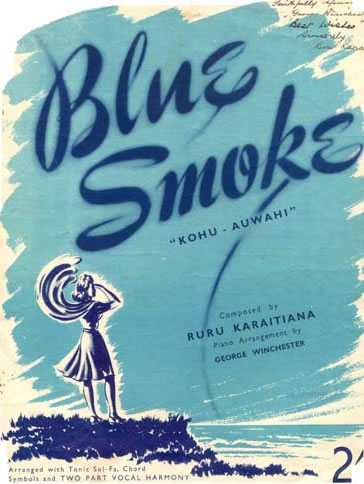See historic events for any day of the year by entering the date below. Why not try your birthday?
Blue smoke

The musical score for 'Blue smoke'
New Zealand's first record
In February 1949 a 78 rpm disc featuring the song ‘Blue smoke’, written by Ruru Karaitiana and sung by Pixie Williams, became the first record wholly produced in New Zealand from composition to pressing. It provided a debut hit-seller for the New Zealand-owned TANZA (To Assist New Zealand Artists) record label.
Karaitiana wrote 'Blue smoke' on the troop ship Aquitania, in 1940 off the coast of Africa, when a friend drew his attention to some passing smoke. During the war he served in the Middle East with the 28th New Zealand (Maori) Battalion. He led the battalion concert party, and he was one of the few survivors of its original 17-member choir. Although it was performed at troop concerts during the war, ‘Blue smoke’ was rejected by London publishers.
Back in New Zealand, he assembled a quintet in 1947. In October 1948, in Wellington, the quintet recorded a version of ‘Blue smoke’ with singer Pixie Williams. The backing music was Hawaiian-style, and the instruments included guitars, ukulele and a lap-steel guitar. Although Karaitiana considered it ‘a poor first effort’, the song topped New Zealand radio hit parades for six weeks, and it sold more than 20,000 copies within a year.
The song attracted strong overseas interest. English duo Anne Ziegler and Webster Booth met Karaitiana and recorded a version. In the United States covers were released by Dean Martin, Al Morgan, Teddy Phillips and Leslie Howard. In 1951 New York music trade magazines described ‘Blue smoke’ as one of the major hits of the year – a ‘musical jackpot’ with both jukebox and radio listeners. Dean Martin even phoned Karaitiana from the United States seeking more songs.
In 1952 Karaitiana became the first New Zealander to gain an Australasian Performing Right Association (APRA) award of £25 for sales of ‘Blue smoke’ and a later hit, ‘Let’s talk it over’, which sold more than 10,000 copies.
Stanley Dallas
The engineer for ‘Blue smoke’, Stanley Dallas, is credited with being one of the first engineers to record an electric guitar by connecting it directly to the recording equipment, rather than using a microphone. He subsequently engineered numerous other TANZA releases, the most successful of which was ‘Maple on the hill’. This song, by country and western group the Tumbleweeds, was one of New Zealand's biggest-selling singles (about 80,000 copies).
Links
- Blue smoke lyrics and further information
- Ruru Karaitiana biography
- Stanley Dallas biography
- Cole Wilson biography
Image reference: Private collection

 Delicious
Delicious Digg
Digg StumbleUpon
StumbleUpon Reddit
Reddit Facebook
Facebook Google
Google


Community contributions